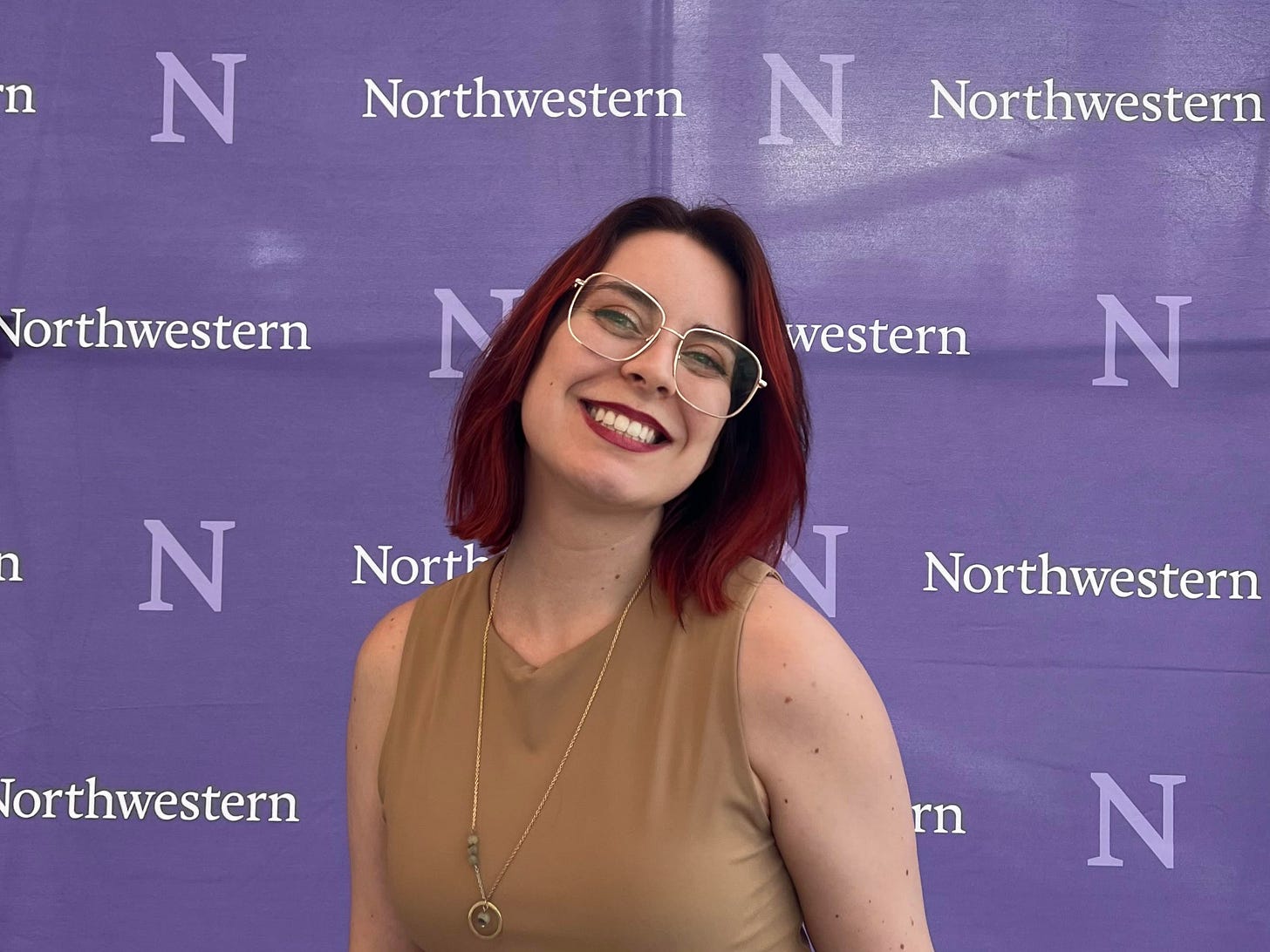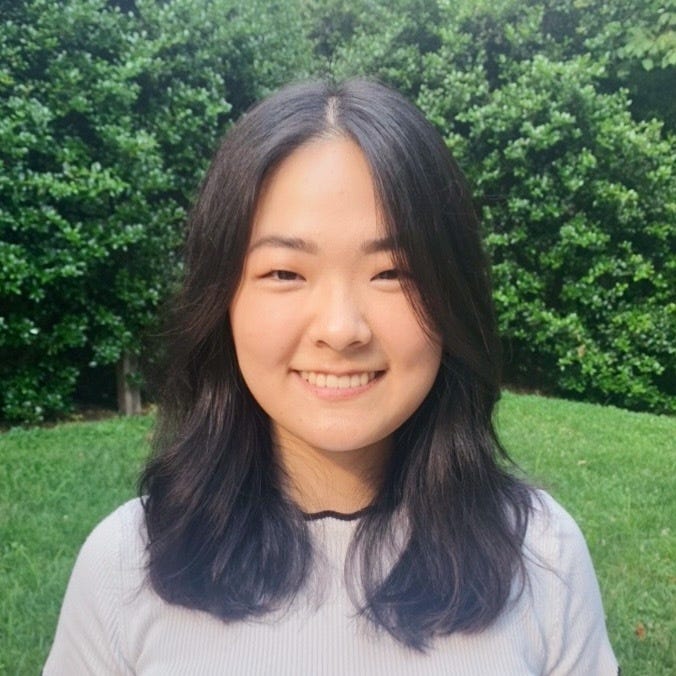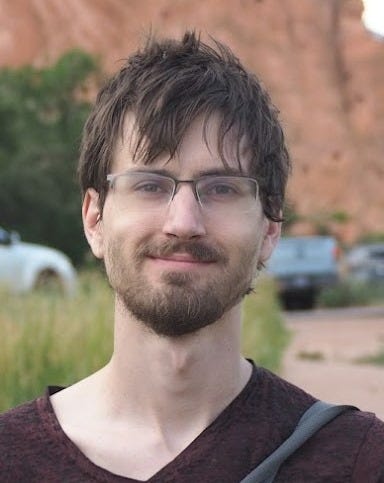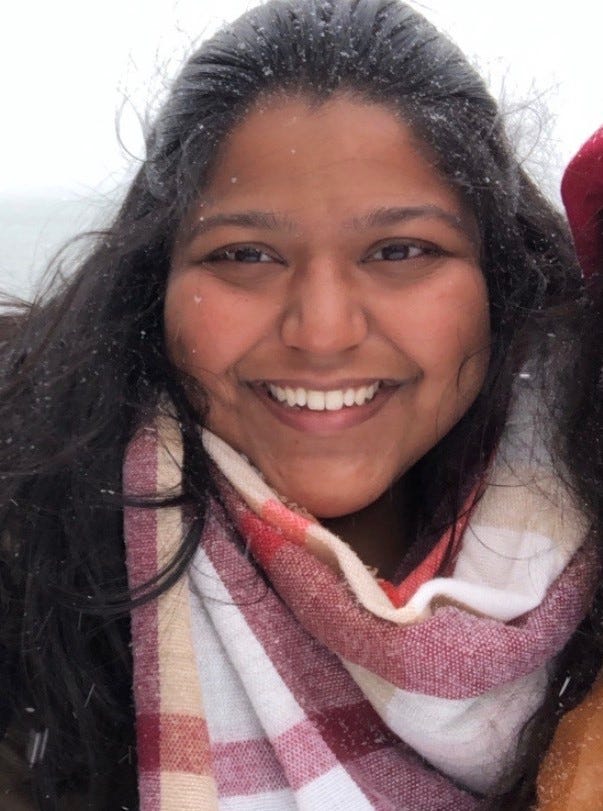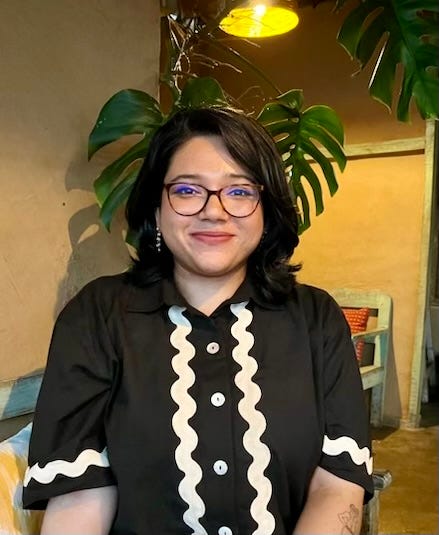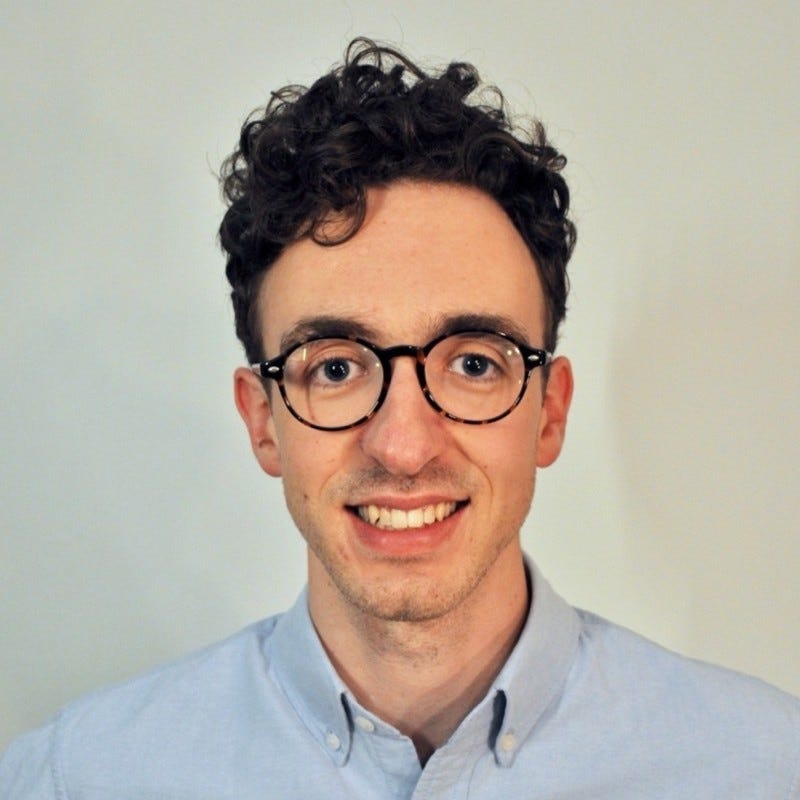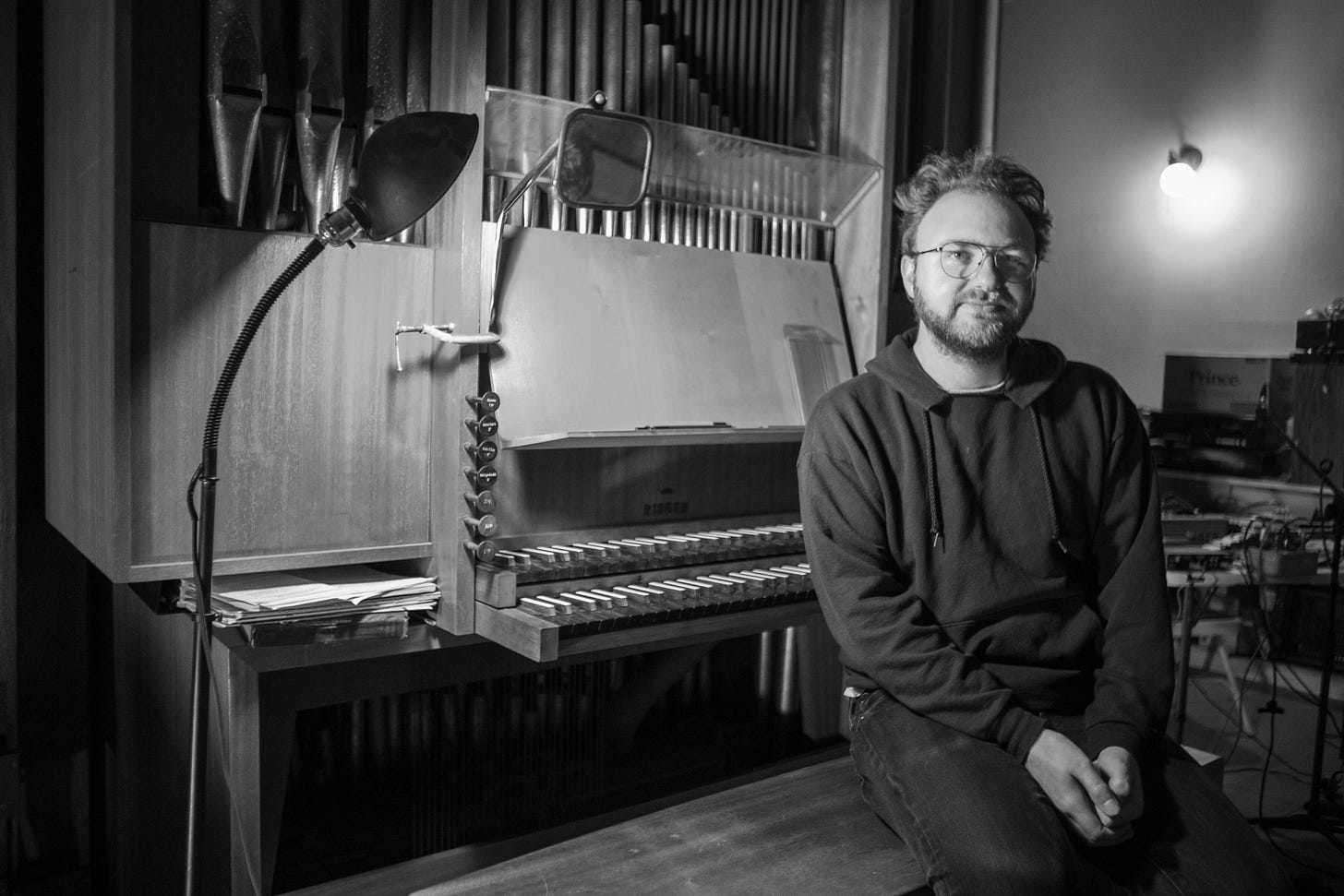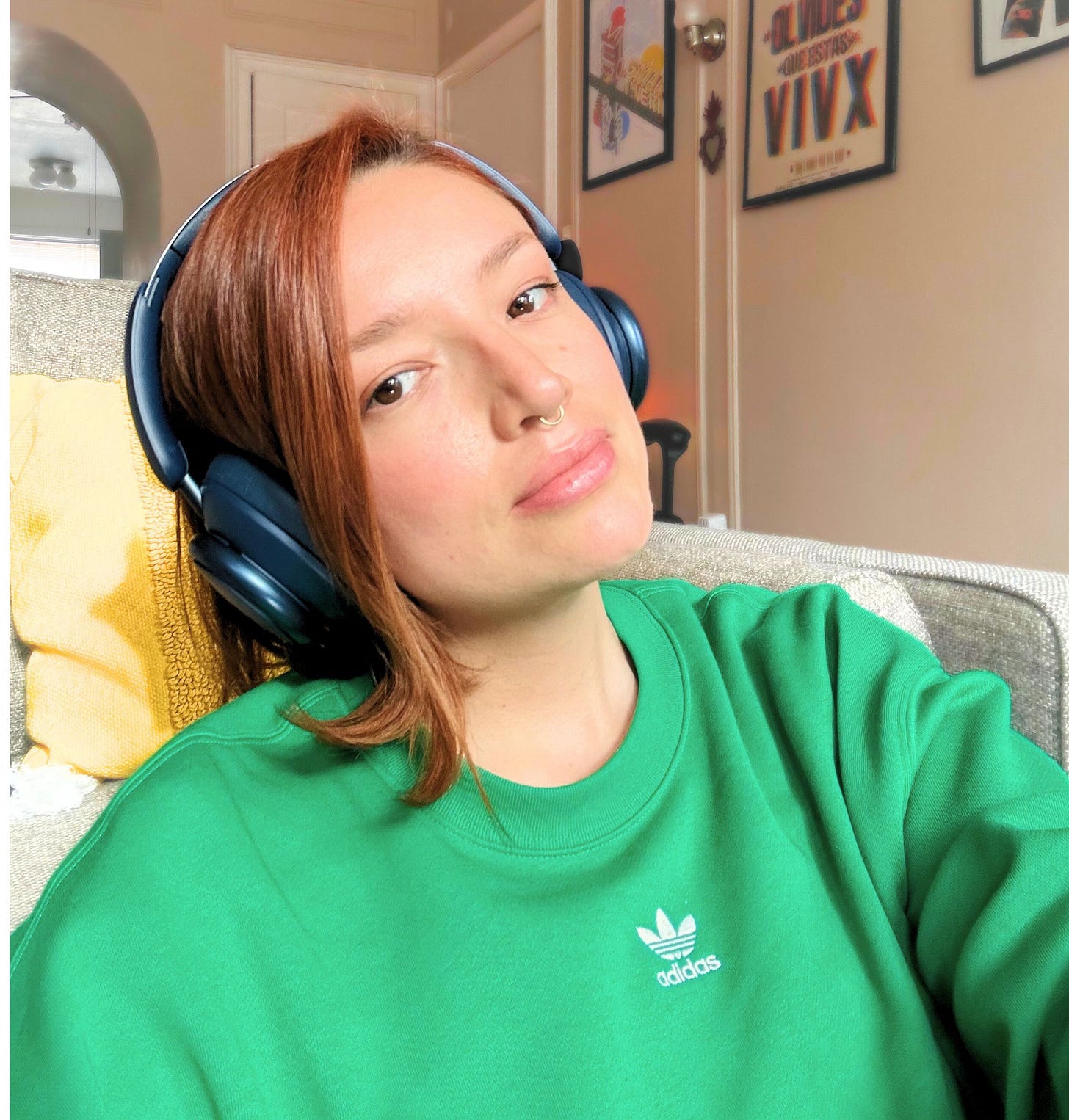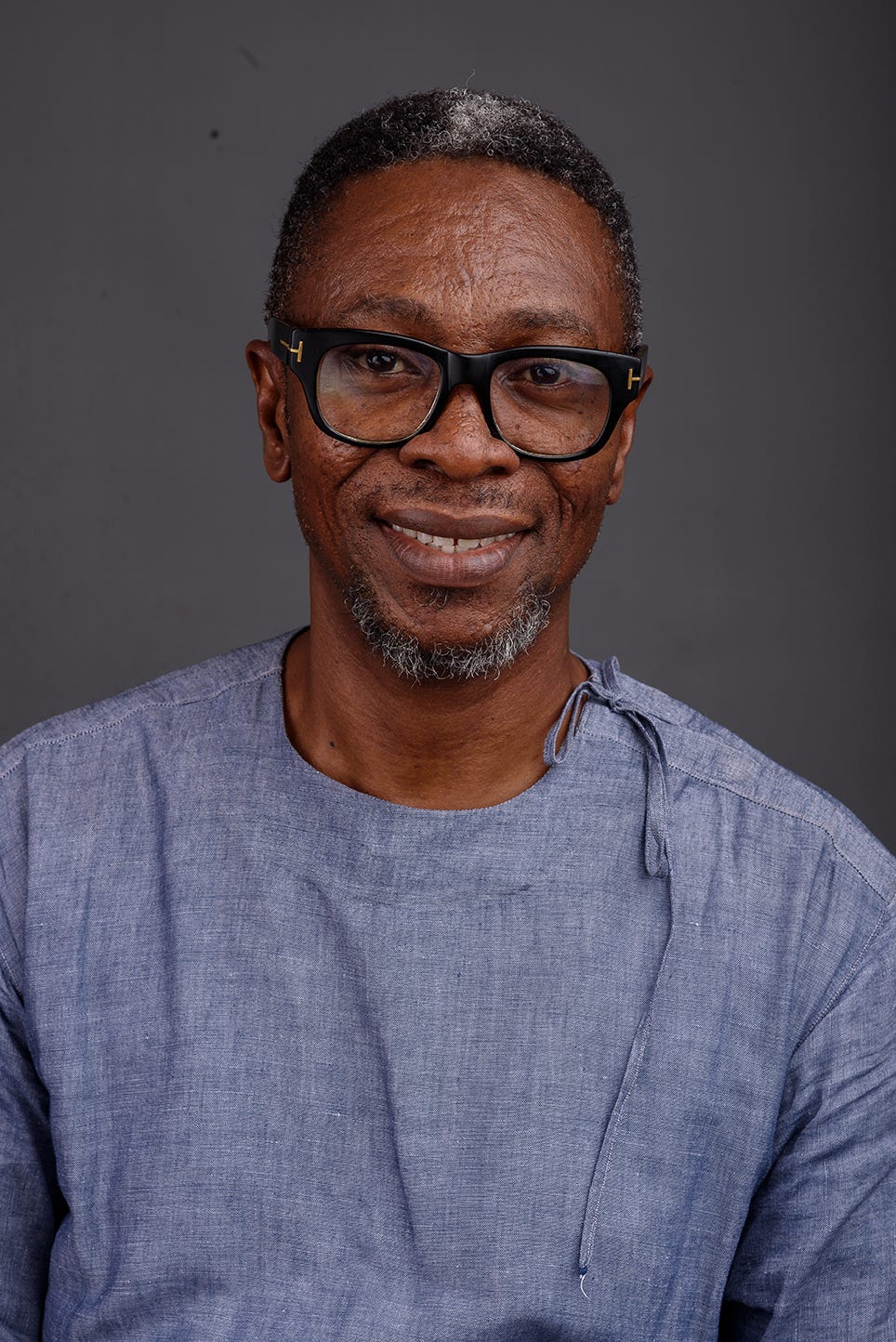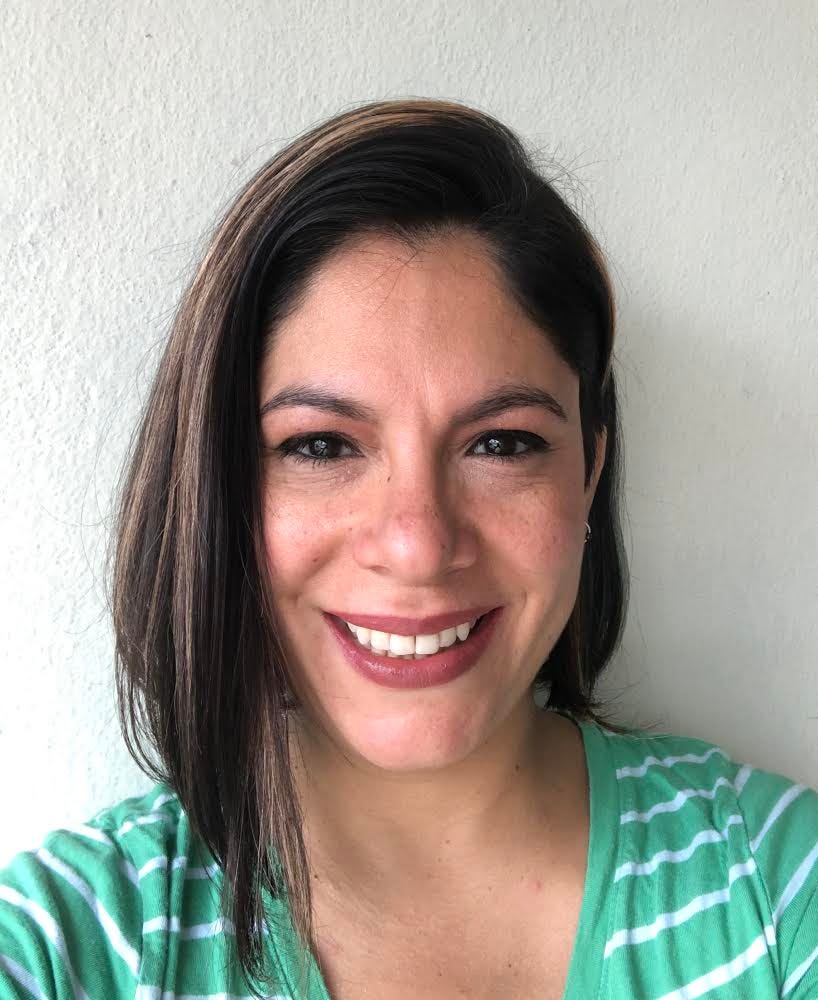Introducing our Public Humanities Fellows
Meet this year's fellows and learn about their exciting projects!

Each year, Northwestern University’s Kaplan Humanities Institute accepts twelve graduate fellows into its Public Humanities Practicum. Each fellow develops their own year-long public humanities project with support and mentorship from Practicum conveners Trish Bredar and Soumya Shailendra.
2024-25 Public Humanities Practicum Fellows
Bridgette Hulse is a 6th year PhD Candidate in the Anthropology department, studying historic graffiti in English cathedrals. She has a love of archaeology, storytelling, and public speaking, and is passionate about making the humanities and social sciences accessible to a public audience. She believes deeply in knowledge for knowledge's sake, and finds joy in using the analytical skills she's gained during graduate school to think about everyday things.
Project: “Indiana Jones and the Real-World Implications of his Archaeological Methods”
Indiana Jones is the most prominent archaeologist in the public consciousness. His fantastical exploits, his world travels, and his iconic accessories are many people's first introduction to archaeology. Although a beloved figure, there are some aspects of Indie's career that are glaringly flawed—most notably, that he is fictional. However, the Indiana Jones movies have instilled in people a fascination with archaeology. In this YouTube video essay, Bridgette utilizes this fascination to introduce people to the real field of archaeology, discussing its faults, its successes, and the current state of the field. To do so, she analyzes the Indiana Jones movies in order to contextualize them within real-world archaeological theory and methods. She discusses the archaeological theories of the time, their intellectual history, and the ethical implications of Indie's work. As such, she uses Indiana Jones as a vehicle to correct misconceptions about archaeology, and demystify the real academic work happening in the field.
Dami Kim is a doctoral student in United States History and a Mellon Cluster Fellow in Gender and Sexuality Studies. Her research focuses on the history of slavery, race, and gender in the 19th-century United States. She holds a B.A. in History and Philosophy from Georgetown University (2024).
Project: “A Rememory of Harriet Hayden's Parlor”
Building on her undergraduate honors thesis "A Rememory of Harriet Hayden," Dami will create a digital exhibition of Harriet’s parlor at 66 Phillips Street in Beacon Hill, Boston. Having escaped to freedom from slavery in Kentucky, Harriet ran an Underground Railroad boarding house that provided refuge to fugitives. Her parlor acted as a space of resistance, community, and respectability for herself and her family, as well as for many Black individuals who passed through. It displayed photograph albums of friends and allies, portraits of loved ones and abolitionist heroes, pikes from the Harpers Ferry raid, Governor Ames’s quill, and Victor Hugo’s artwork. This exhibition hopes to serve as a visual and accessible memorial to Harriet Hayden.
Sophia Elzie is a second year PhD student in Comparative Literary Studies with a home department in Classics. She holds a Mellon Interdisciplinary Cluster Fellowship in Theater and Performance Studies. Sophia is broadly interested in engagements with ancient tragedy in the United States and the reception of Greek and Roman literature in de/postcolonial contexts.
Project: “Antigone in Chicago”
Antigone in Chicago broadly asks the questions "why this play here?" and "why this play now?" Antigone is the most popular tragedy in the city, with more than 30 productions that engage with the tragedy since 1946 (and counting!). This project examines Chicago's own history through past productions of the play and considers why Antigone remains popular up to the present moment.
Daniel Atwood is a doctoral student in the musicology department. He has presented at the conferences of the Society for Seventeenth-Century Music, Association Répertoire International d’Iconographie Musicale, and the Royal Music Association. He recently published a chapter in an edited volume on incorporating film and video game music in the music history classroom.
Project: “Licks from the Loop: Highlighting Chicago’s Street Musicians”
This project involves creating a series of short TikTok/YouTube/Instagram videos highlighting street musicians who perform in downtown Chicago. Each episode will feature a different musician, blending interview segments with live performances recorded on the streets. The musicians will share a bit about their music and background before demonstrating one or two of their favorite licks or musical techniques for the viewer. The videos will include on-screen sheet music or tablature of the riffs, offering viewers a chance to learn "licks from the Loop." Blending performance, music education, and storytelling, this series highlights the musical artists who contribute the unique soundscape and cultural fabric of downtown Chicago.
Achi Mishra is a first year PhD student in Technology and Social Behavior. Her research explores the impact of emerging technologies such as AI on marginalized communities. More importantly, she’s passionate about bridging the gap between Academia and the public, as well as the arts and STEM. Outside of academia, Achi is an avid short story writer currently exploring magical surrealism.
Project: “Ethics in the Loop: Reimagining the AI Future“
“Ethics in the Loop: Reimagining the AI Future” is a collaborative, speculative fiction anthology centered around ethical issues within AI systems. Through a seven-part workshop series, creative writers in Chicago will learn about the harms of AI. Each workshop will have a different theme and consist of an AI case study, a free-writing session, and a discussion devoid of writing critique. Ultimately, the goal of this project is to amplify the voices of creative writers in the Chicago area and see the AI future through their eyes. This interdisciplinary approach could shed light on key issues and nuances missed by those developing AI technologies with a siloed approach. The project will culminate in book launch and public reading.
Arundhati Chauhan is a doctoral student in Screen Cultures at the Department of Radio, Television and Film, Northwestern University. Their research centers the documentary as an aesthetic mode, across non- fiction film and video art. Arundhati is interested in non-theatrical film and video practices from the late 1970s till the early 2000s, refracted through the lens of south-south solidarities and networks at the tail end of the Cold War, proliferation of mobile infrastructures and new ways of making, circulating and collectivizing film. Through their research, they question how contextualized practices borne out of a ‘universal’ documentary form respond to changing aesthetic registers, conditions of production, and fugitive circulation.
Project: “Towards a Screening Commons”
Building on the strategies towards a filmworker-led and people-oriented approach to cinema, the project is in conversation with some of the activist and people-led film festivals and collectives from South Asia. Arundhati explores the possibilities of bringing together a platform where invited programming of films can be made available to watch, for a limited period of time, accompanied with some public programming (such as a short discussion post screening, a public lecture, or a written essay) that can accompany the ‘event’ of the screening. This project aims to bring to light the vast and tireless work being done to state non-theatrical film through collaborative networks of filmmakers, film workers, and civil society. In exploring what a digital screening medium can do, Arundhati also opens up a more diverse audience for the exciting new work happening in the region.
Austin Bryan focuses on biopolitics, global health, development aid, social movements, and comparative law. His dissertation analyzes global medical apartheid logic and practices. He has conducted long-term ethnographic fieldwork with healthcare workers, development aid workers, and LGBTQ+ and HIV activists in Uganda. His research has been published in the Journal of Eastern African Studies, edited collections on Popular Culture in Africa and Human Rights, and collaborative human rights reports with activist interlocutors. At Northwestern, he worked as a Research Assistant at the Buffett Institute for Global Affairs and as a coordinator of AfriSem in the Program of African Studies. Before joining Northwestern, he earned his BA in Africana Studies from North Carolina State University, where he was a Park Scholar and Caldwell Fellow.
Project: “Zine Series for Uganda’s Public Healthcare Workers”
This project proposes the creation of a zine series aimed at Ugandan public healthcare workers, translating research on the stigmas they face under the Anti-Homosexuality Act 2023. Each zine will address key challenges, ethical dilemmas, and coping strategies related to providing care for key populations affected by HIV. Topics include socio-legal stigma, stigma by association, navigating ethical responsibilities, and resilience through advocacy. By employing visual storytelling, these zines will serve as accessible tools for healthcare professionals, enhancing understanding of their rights and promoting LGBTQ+ affirming care. The project will facilitate broader discussions and support within the healthcare community.
Jack Langdon (b. 1994, Sault Ste. Marie Tribe of Chippewa Indians) is a musician, filmmaker, and writer with concentrations in experimental music, minimalist documentary, and cultural politics. Across mediums, Jack’s work stages elusive, complex encounters with commonplace subjects, scenes, and sounds. As a musician, he has created extensive work for pipe organs, regularly performs on a variety of keyboard instruments, and the Ojibwe bibigwan. His films focus on landscape and memory. He writes on the workplace politics of American independent music making and his work has been published by Sound American, IMPREC, Lobby Art, Sawyer Editions, and Dinzu Artefacts.
Project: “Improvised Music with Pipe Organ”
Jack’s project will be a series of organ performances held at various churches around Chicago that highlight the improvisational capacities of the organ by performing alongside esteemed members of the improvised music community. Each concert will take place in three parts and will last a total of ninety minutes: an opening musical performance with Jack and his collaborator, a discussion with the collaborator about improvisation and their relationship to religious culture, and an open improvisation which will invite anyone from the audience to join in a performance with myself and the guest improviser. It is his hope that, through these performances, the pipe organ can be reimagined beyond its monolithic identity as an instrument in service of European Classical Music and Christendom—allowing a more capacious and complex identity to emerge through improvised performance, community discussion, and public advocacy.
Sofía Sánchez is a fourth-year doctoral candidate in the Department of Spanish and Portuguese. Her dissertation examines the intersection of theater, gender, and activism in Colombia, facilitating collaborations with theater companies and organizations that employ theatrical practices as a means of psychosocial reparation in communities affected by the armed conflict. Her research specifically focuses on theater initiatives developed by young offenders in juvenile detention facilities and extends to collaborations with Afro-feminist collectives and Indigenous communities engaged in cultural and political self-representation through theater.
Project: “Stages of Redemption: A Manual for Restorative Justice through Theater”
This project aims to publish a manual featuring writing and body exploration exercises rooted in theatrical principles, which have demonstrated effectiveness in working with young offenders in juvenile detention facilities in Medellín, Colombia. This initiative is a collaboration with La Parla, an organization dedicated to facilitating play creation in prisons to advance Restorative Justice processes. The manual will encompass six carefully curated exercises, each accompanied by detailed instructions, photographs, and testimonials from participants. These activities promote exploration and reflection on the traumatic experiences of these young individuals, who face the dual stigma of being both victims and perpetrators of conflict, as many were forcibly recruited by paramilitary groups during Colombia's internal strife. This project seeks to disseminate the effective tools derived from a local artistic experience to educators, social workers, therapists, and others interested in engaging with young offenders in diverse contexts.
Srishti Chatterjee is a first year PhD student in Rhetorics, Media, and Publics at the Department of Communications, researching the relationship of data visualizations with public political communications. They are an experienced public justice organizer, having worked in gender, racial and economic justice in community and union movements across India and Australia. They enjoy reading and cooking copious amounts of Bengali food!
Project: “Mapping Dissent: Visualizing How Communities Design Dissent”
In this project, Srish is working with community organisers, activists, designers, teachers, and policymakers to deliver a workshop and an exhibition of maps that archive and tell activist stories -- those printed on paper, as well as interactive maps. Srish is also interested in developing a living archive of map outlines used as logos and motifs in political communications, such as the maps of Palestine and Kashmir.
Uche Okpa-Iroha is a doctoral student in the department of Art History, Northwestern University. Okpa-Iroha is the Founder of the Lagos-based informal photography school, The Nlele Institute, and the Lagos Portfolio Review. He is a two-time winner of the Grand Prix Seydou keita Award for the best photography creation at the eighth and tenth Bamako Encounters with the Under Bridge Life and The Plantation Boy projects in 2009 and 2015 respectively. Okpa-Iroha is an ex-resident and alumnus of the Rijksakademie van Beeldende kunsten, Amsterdam, the Netherlands (2011- 2012).
Project: “Shifts in Nigeria’s Contemporary Photography Landscape”
This project aims to explore and amplify the voices of Nigerian photographers who are pushing boundaries using a wide range of mediums, forms, the exploration of materiality, engagement with archives, use of technology and artificial intelligence to challenge stereotypes and creating works that resonates both locally and globally in art fairs, and photography biennials around the world. This project incorporates an exhibition, artists-public/community-based programs in Chicago that explore how contemporary Nigerian photographers address specific themes such as the impact of rapid urbanization in Lagos, the complexities of youth identity, cultural heritage, political activism, and how they navigate Nigeria’s place in global art and cultural conversations. By highlighting these diverse perspectives, the project will showcase the unique visual narratives from Nigeria. The project intends to connect the Nigerian visual culture to Chicago audiences, engaging a wide audience in meaningful dialogue about place, people, and cultural identity.
Mariel Melendez Mulero is a Puerto Rican ethnographer, artist, and educator. She obtained a BA in Anthropology from Universidad de Puerto Rico and an MA in Dance Anthropology from University of Roehampton. As an undergrad and COR/NIMH-Research Fellow, she conducted research in Psychology, Sociology and Medical Anthropology. She performed with Ballet Concierto de Puerto Rico, later became a company member at Ballet Municipal de San Juan, then attended the school of Alvin Ailey in New York. While in London, she documented voguing culture and embodied participation. In 2017 upon returning to Puerto Rico, she obtained her certificate in Montessori adolescent studies. She is currently a PhD student at the Theater and Drama program her research interests are Puerto Rican dance and corporealities, as well as dance dramaturgy and choreography.
Project: “Mapping the Cartographies of the BalletRican Imaginary”
Through oral history, ethnography and archival work this project documents Puerto Rican ballet dancers’ histories into a series of digital maps to trace their trajectories across a transnational cartography. It engages the interdisciplinarity of theater and dance history, anthropology, the body, its corporealities, Caribbeanness and the Latinx experience. The following questions guide inquires: What is the relationship that exists between the island’s modern and contemporary history and the development of ballet as a discipline? What elements of the Puerto Rican diasporic and transnational experience inform ballet as a national and embodied aesthetic? By tracing individual dancers’ experiences, this mapping project visualizes the choreographies of the BalletRican imaginary. It furthers understanding on the role of ballet within the canon of Puerto Rican dance and corporeality, as well as its present-day importance in building community, memory and belonging across the Rican transnational experience.




